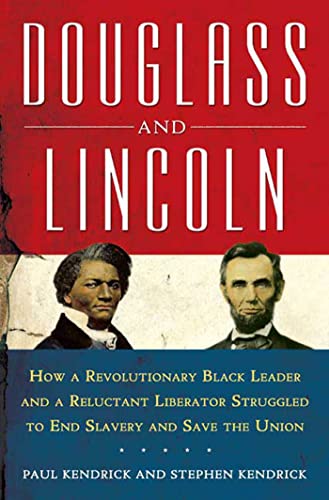Douglass and Lincoln: How a Revolutionary Black Leader and a Reluctant Liberator Struggled to End Slavery and Save the Union - Hardcover

Inhaltsangabe
Frederick Douglass and Abraham Lincoln had only three meetings, but their exchanges profoundly influenced the course of slavery and the outcome of the Civil War.
Although Abraham Lincoln deeply opposed the institution of slavery, he saw the Civil War at its onset as being primarily about preserving the Union. Frederick Douglass, himself a former slave, by contrast saw the War's mission to be the total and permanent abolition of slavery. And yet, these giants of the nineteenth century, despite their different outlooks, found common ground, in large part through their three historic meetings.
Lincoln first invited Douglass to the White House in August 1862. Well-known for his speeches and his internationally read abolitionist newspaper, Douglass laid out for the president his concerns about how the Union army was discriminating against black soldiers. Douglass, often critical of the president in his speeches and articles, was impressed by Lincoln's response. The following summer when the war was going poorly, the president summoned Douglass to the White House. Fearing that he might not be reelected, Lincoln showed Douglass a letter he had prepared stating his openness to negotiating a settlement to end the Civil War—and leave slavery intact in the South. Douglass strongly advised Lincoln against making the letter public. Lincoln never did; Atlanta fell and he was reelected. Their final meeting was at the White House reception following Lincoln's second inaugural address, where Lincoln told Douglass there was no man in the country whose opinion he valued more and Douglass called the president's inaugural address "sacred."
In elegant prose and with unusual insights, Paul and Stephen Kendrick chronicle the parallel lives of Douglass and Lincoln as a means of presenting a fresh, unique picture of two men who, in their differences, eventually challenged each other to greatness and altered the course of the nation.
Die Inhaltsangabe kann sich auf eine andere Ausgabe dieses Titels beziehen.
Über die Autorinnen und Autoren
Paul Kendrick is a Presidential Arts Scholar at George Washington University. His father Stephen Kendrick is the senior minister of First and Second Church in Boston. They are the authors of Sarah's Long Walk: The Free Blacks of Boston and How Their Struggle for Equality Changed America.
„Über diesen Titel“ kann sich auf eine andere Ausgabe dieses Titels beziehen.
Weitere beliebte Ausgaben desselben Titels
Suchergebnisse für Douglass and Lincoln: How a Revolutionary Black Leader...
Douglass and Lincoln: How a Revolutionary Black Leader & a Reluctant Liberator Struggled to End Slavery & Save the Union
Anbieter: Wonder Book, Frederick, MD, USA
Zustand: Very Good. Very Good condition. Good dust jacket. With remainder mark. Artikel-Nr. G09F-00545
Douglass and Lincoln: How a Revolutionary Black Leader & a Reluctant Liberator Struggled to End Slavery & Save the Union
Anbieter: ThriftBooks-Dallas, Dallas, TX, USA
Hardcover. Zustand: As New. No Jacket. Pages are clean and are not marred by notes or folds of any kind. ~ ThriftBooks: Read More, Spend Less. Artikel-Nr. G0802715230I2N00
Douglass and Lincoln: How a Revolutionary Black Leader & a Reluctant Liberator Struggled to End Slavery & Save the Union
Anbieter: ThriftBooks-Atlanta, AUSTELL, GA, USA
Hardcover. Zustand: Very Good. No Jacket. May have limited writing in cover pages. Pages are unmarked. ~ ThriftBooks: Read More, Spend Less. Artikel-Nr. G0802715230I4N00
Douglass and Lincoln : How a Revolutionary Black Leader and a Reluctant Liberator Struggled to End Slavery and Save the Union
Anbieter: Better World Books, Mishawaka, IN, USA
Zustand: Very Good. Used book that is in excellent condition. May show signs of wear or have minor defects. Artikel-Nr. 4430548-6
Douglass and Lincoln : How a Revolutionary Black Leader and a Reluctant Liberator Struggled to End Slavery and Save the Union
Anbieter: Better World Books, Mishawaka, IN, USA
Zustand: Good. Used book that is in clean, average condition without any missing pages. Artikel-Nr. 3496018-75
Douglass and Lincoln : How a Revolutionary Black Leader and a Reluctant Liberator Struggled to End Slavery and Save the Union
Anbieter: Better World Books, Mishawaka, IN, USA
Zustand: Very Good. Former library book; may include library markings. Used book that is in excellent condition. May show signs of wear or have minor defects. Artikel-Nr. 3496020-75
Douglass & Lincoln: How a Revolutionary Black Leader & a Reluctant Liberator Struggled to End Slavery & Save the Union.
Anbieter: Powell's Bookstores Chicago, ABAA, Chicago, IL, USA
Zustand: Used - Very Good. 2007. Hardcover. Cloth, dj. Minor shelf-wear. Very Good. Artikel-Nr. SOL08742
Douglass & Lincoln: How a Revolutionary Black Leader & a Reluctant Liberator Struggled to End Slavery & Save the Union.
Anbieter: Powell's Bookstores Chicago, ABAA, Chicago, IL, USA
Zustand: Used - Very Good. 2007. Hardcover. Very Good. Artikel-Nr. Z0271561
Douglass and Lincoln: How a Revolutionary Black Leader & a Reluctant Liberator Struggled to End Slavery & Save the Union
Anbieter: Wonder Book, Frederick, MD, USA
Zustand: As New. Signed Copy First edition copy. . Like New dust jacket. 1st U.S. edition. Signed by both authors on title page. Artikel-Nr. S24OS-01253

